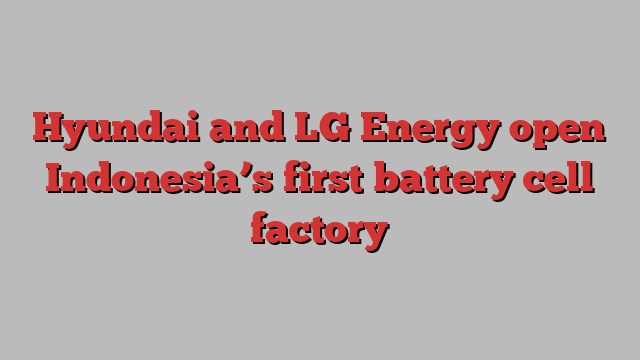
Unlock the Editor’s Digest for free
Roula Khalaf, Editor of the FT, selects her favourite stories in this weekly newsletter.
Hyundai and LG Energy Solution have opened a $1.1bn battery cell plant in Indonesia as the south-east Asian country works to build an electric vehicle ecosystem.
The launch of the country’s first battery plant on Wednesday is part of Indonesia’s push to move up the global EV supply chain. Indonesia has the world’s largest reserves of nickel, a crucial component in EV batteries and steelmaking.
Jakarta has stepped up efforts in recent years to bring in investments for nickel processing and battery and car manufacturing. Chinese automaker BYD and Vietnam’s VinFast said this year that they would begin making EVs in Indonesia.
Hyundai and LG launched the factory in Karawang, a city east of the capital Jakarta. It is the first in Indonesia and will have an annual production capacity of 10 gigawatt hours.
“We have an abundance of natural resources but for decades we only exported them as raw materials with no added value,” Indonesian President Joko Widodo said at the launch. “Now with the construction of smelters and the EV battery cell factory, we will become an important global player in the EV global supply chain.”
Hyundai and LG will invest a total of Rp160tn ($9.8bn) in Indonesia’s EV ecosystem in stages, he added.
Investment minister Bahlil Lahadalia said the South Korean companies would begin constructing the second phase of the battery cell factory, which will have an annual production capacity of 20 gigawatt hours, with an investment of $2bn.
The battery cells from the Indonesian plant will be used in Hyundai and Kia’s EV models. Indonesian officials have also said about 90 per cent of the factory’s products will be exported to South Korea and India.
The two companies have a 50-50 stake in the project, which was first announced in 2021. Hyundai also has a car manufacturing plant in Indonesia, with a capacity to produce 250,000 units per year.
“Mineral resources in this country, such as iron and nickel, are key components for batteries that will mobilise millions of EVs all over the world,” said Chung Eui-sun, executive chair of Hyundai.
Widodo’s ban on nickel ore exports in 2020 forced foreign companies to invest onshore. The bulk of that investment has come from Chinese companies into the nickel processing sector.
But Indonesia has been offering incentives such as tax breaks to woo nickel and EV-related investments from around the world. Hyundai said in 2021 that the Indonesian government had agreed “to offer various incentives and rewards to support the stable operation” of its battery cell plant.
Since Hyundai and LG Energy first announced they were going to open a battery cell plant in Indonesia, demand for EVs has slowed. Still, analysts said the country would benefit from the global transition to cleaner transportation.
China’s CATL, the world’s biggest EV battery manufacturer, has also started building a battery plant in the country, said Indonesian officials.
“Indonesia is at the very early stage of EV manufacturing and stands to benefit from incremental gains over the long term, regardless of whether EV moves in the fast or slow lane,” said Kai Wei Ang, Asean economist at BofA Securities.